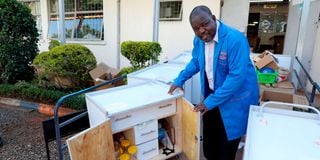Premium
Alarm as public schools fail to acquire science kits

School Equipment Production Unit CEO Joel Mabonga displays a primary school science kit at the institution's workshop in Nairobi on March 21, 2024.
What you need to know:
- There are over 23,000 public primary schools in Kenya.
- Public primary schools do not have science laboratories.
Only 2,500 public primary schools have acquired science kits required for the competency-based curriculum (CBC), dealing a huge blow to implementation of the curriculum that is now in the second year of junior school.
The revelation was made by Joel Mabonga, the chief executive officer of the School Equipment Production Unit (Sepu), which makes and supplies the kits.
There are over 23,000 public primary schools in Kenya, implying that learners in more than 20,000 do not have the kits for practical learning in science learning areas.
The Basic Education Curriculum Framework has a bias towards teaching and learning of science, technology, engineering and mathematics (Stem).
It is expected that 60 per cent of learners will pursue the Stem pathway as they transition to senior school. The other pathways are arts and sports science, and social sciences.
Public primary schools do not have science laboratories, and plans to construct some were laid out since the decision was made to domicile junior school in primary schools.
However, some of the schools that are in close proximity to secondary schools have made arrangements to share the resources.
Apart from shortage of equipment and inadequate infrastructure, junior schools are grappling with a serious teacher shortage.
Majority of the teachers were recruited last year on contract basis. Many teachers who talked to the Nation said that they are lagging behind in syllabus coverage.
The poor acquisition of science kits comes at a time when the government is struggling to fund basic education under its free education programmes.
Learners in Grade 1 to 6 (primary school) receive a capitation of Sh1,420 annually while those in junior school (grades 7 to 9) receive Sh15,042.
“The primary challenge is finding a solution to ensure [that] schools receive adequate funding. Despite other pressing concerns, such as calls for increased capitation and delays, our main focus is on securing funding to address these needs effectively,” Dr Mabonga told the Nation.
A mobile laboratory made by Sepu goes for Sh200,000 while a science kit for use by learners in Grade 1 to 6 retails at Sh70,000. An integrated science kit for Grade 7 sells at Sh77,000.
“Our approach allows schools to initially pay 60 per cent of the total cost, with the balance payable within the term,” Dr Mabonga said.
He added that inadequate funding, coupled with insufficient sensitisation, poses a significant barrier to obtaining the kits and implementation of CBC.
Dr Mabonga noted that without these resources, learners would rely heavily on theoretical learning, contradicting a key objective of CBC—practical education.
“There will be a bit of wastage for the learner... the aims and objectives of CBC will not be attained fully. If they did not have, for example,” he said.
While public schools have been slow in acquiring the science kits, Dr Mabonga noted a significant interest and uptake of the same by private schools, where conversions of existing classrooms into labs are also common practice.
“There’s notably higher interest and uptake, particularly within private schools, where many have been repurposing existing classrooms into labs,” he said.
“The Constituency Development Fund can come in very strongly to support the equipping of schools, particularly in science. That would be a game changer for CBC.”






